Malware, Adware, Spyware, & Ransomware: How They Differ and How to Respond Them
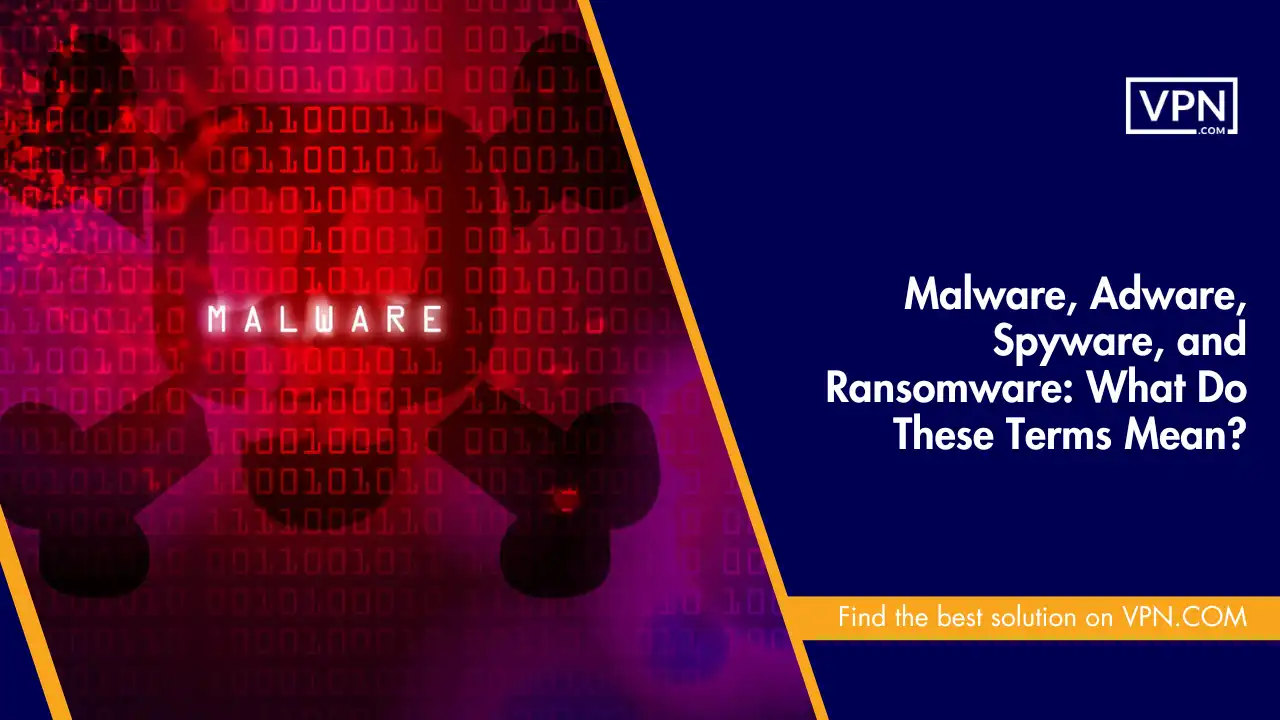
In today’s digital world, bad software is one of the huge problems we face. It’s a danger for people and businesses that are growing day by day. We use computers and the internet for everything to do in this digital world. We need to know about the different kinds of bad software. This software can be found everywhere and infects your computer. So we need to protect ourselves and our data better.
Malware, adware, spyware, and ransomware are all dangerous software that infect your devices. They can also cause serious problems. By following us step by step, we’ll tell you what makes each one different and how you can stay protected and keep your personal information from them.
We’ll get to know about the world of dangerous, malicious, or bad software. We will guide you further on how to take steps to keep your computer and information secure.
What is Malware?
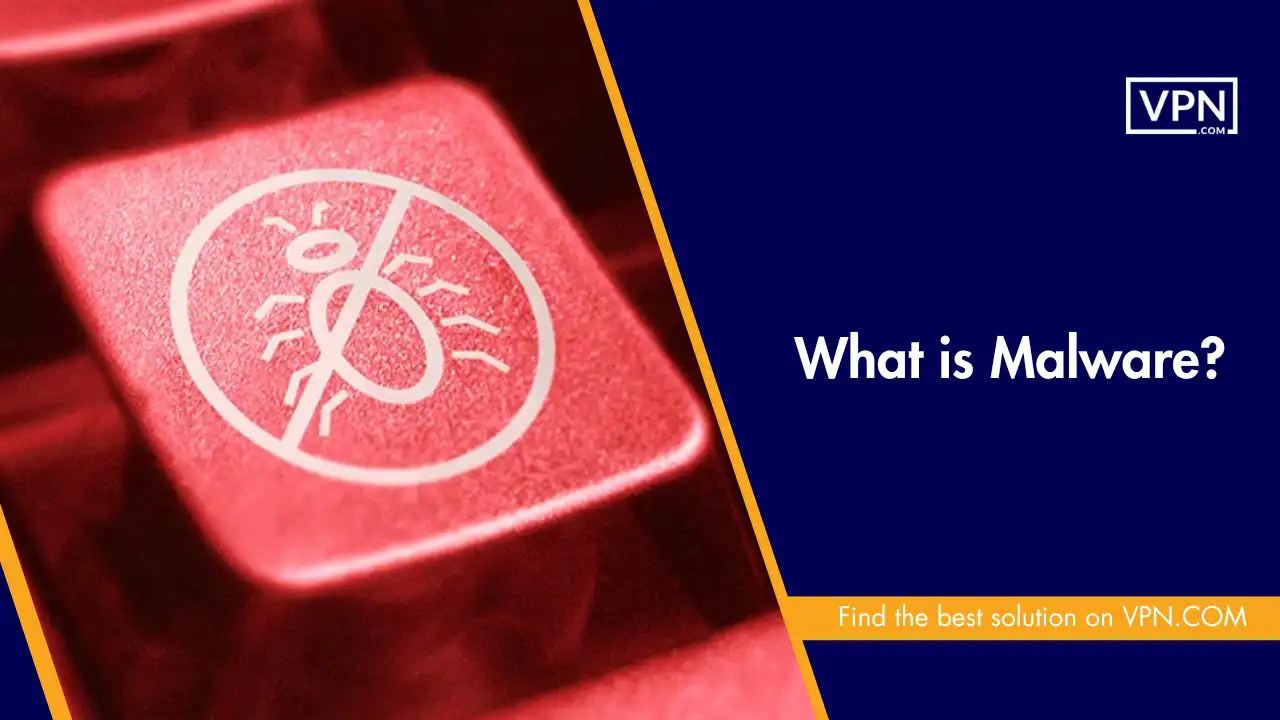
Malware is short for “malicious software”. It is a very dangerous and infected software that can damage your data and the information saved on your computer. It’s made by criminals and anonymous users who want to do things like:
- Break into your computer
- Mess it up
- Steal your private stuff
- Make you pay them money
It can spread in sneaky ways, like:
- Emails with bad attachments
- Websites that aren’t safe
- Downloading software that’s infected
- Finding weak spots in your computer’s defenses
One famous example of malware was the WannaCry attack in 2017. It affected computers all over the world. It locked up people’s files and wouldn’t let them back in unless they gave them money. It caused a lot of trouble and cost billions of dollars. It even affected important places like hospitals and transportation.

Get Started w/ NordVPN Today
- Top-rated VPN for OS unknown
- Ultra-fast speed in US in 2024
- Save 69% off with VPN.com Discount
- Plans starting at $2.99/month
- Rated 4.5/5 on Google Play with over 825,000 reviews
- Rated 4.7/5 on Apple App Store from 6,600 users
What Is Adware?
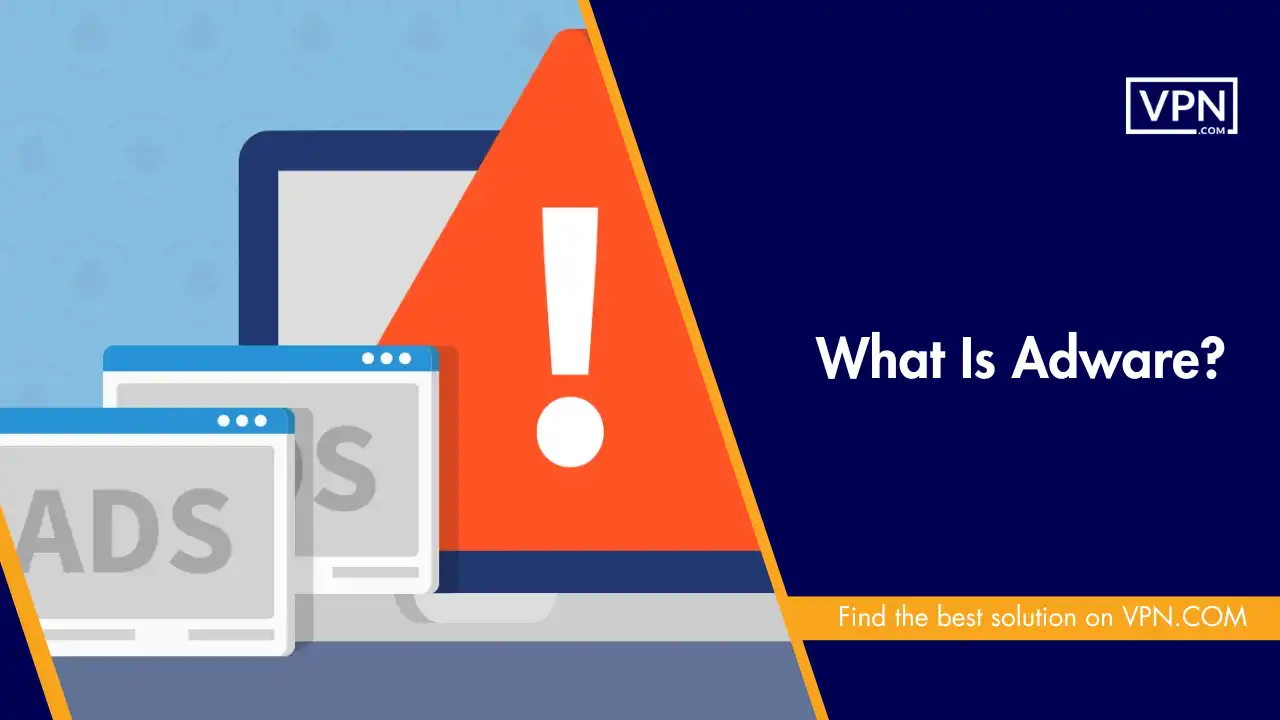
Adware is software that shows you unnecessary ads you don’t want on your computer. These ads can pop up or be banners and that will irritate you a lot. This malicious software can be annoying and get in the way while you are doing your work. It can slow down your computer and bug your important work.
Sometimes, it also follows what websites you visit. It does this so it can show you ads about things you like and do searches about. It is slightly different from other bad software because it just wants to make money and do commercials by showing you ads. It usually doesn’t mean to hurt your computer or take your information.
Be aware and look out! Sometimes this malicious software comes with other software that is more dangerous. It can also trick you into clicking on ads that take you to bad websites.
What is Spyware?

Spyware is sneaky software that watches what you do on your computer without you knowing. It collects your private information, like:
- What websites do you visit
- Your usernames and passwords
- Bank account details
- Even what keys you press!
This lets the bad guys steal your identity or get into your accounts. It often goes after regular people to get their info and money. However, it can also spy on businesses and governments to get secrets or an advantage.
It spreads in tricky ways, like fake emails, bad downloads, and websites that take advantage of weak spots in your web browser.
What is Ransomware?

Ransomware is a malicious and very dangerous type of software. It locks up your files and confidential information. They won’t let you use them unless you give money to the criminals. They usually want special digital money from the affected user.
This can make it a daunting task for you to get to your data. It can turn off your whole computer, business, or organization until you give them money. Or you can find a way to get your files back from backups.
How are Spyware, Malware, and Ransomware Different?
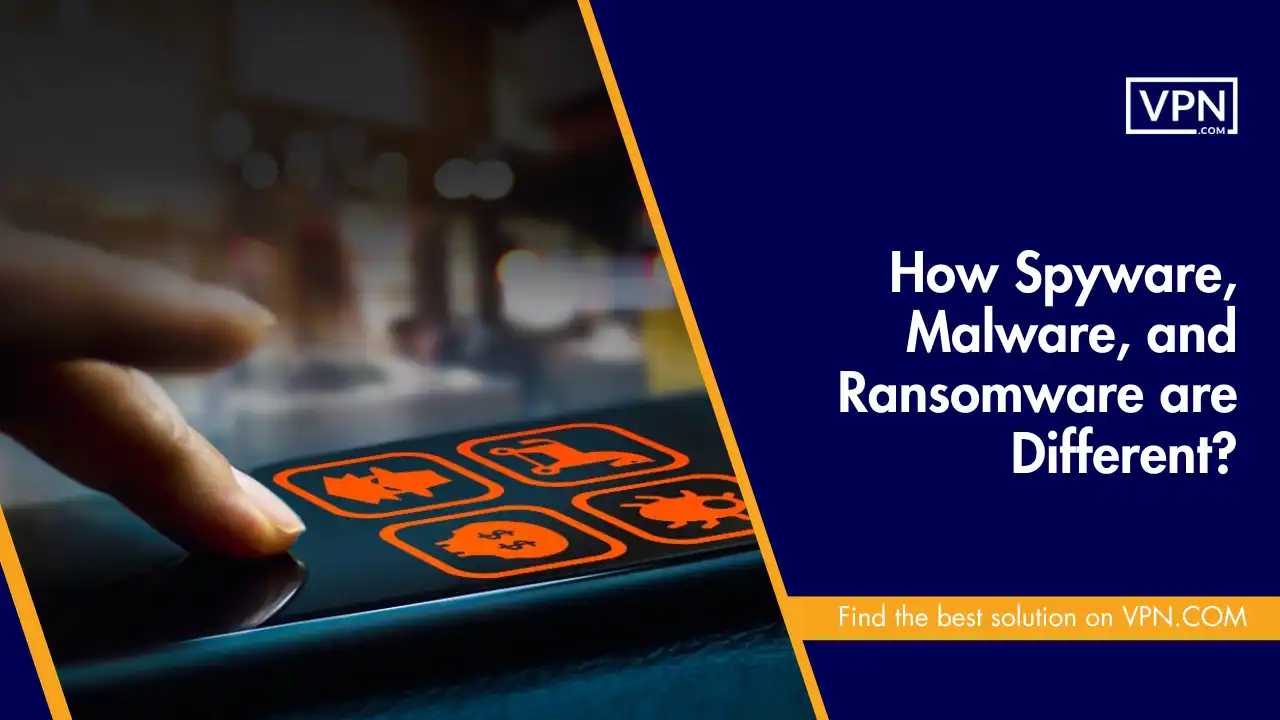
Spyware, malware, and ransomware are all kinds of dangerous software that can affect your computer. But they’re not the same. Here’s how they’re different:
- They each have their sneaky plans
- Some are way worse than others
- Getting rid of them can be tricky in different ways
Knowing how they’re different can help you protect your computer better and figure out what to do if something bad happens.
What They’re Trying to Do?
One big difference between these types of bad software is what they’re trying to achieve:
- Spyware is sneaky. It watches what you do and steals your information. Then it sends that info back to the bad guys.
- Malware is a big group that includes all kinds of bad software. Depending on the type, it might steal your data, break your computer, or try to get money.
- Ransomware is all about getting money from you. It locks up your files and won’t let you use them until you pay the bad guys to get them back.
How They Can Hurt You?
The kind of trouble these bad programs can cause is different too:
- Spyware gets into your private stuff and can lead to identity theft if they steal important information.
- Malware can mess things up in lots of ways, like making you lose your files, slowing down your computer, or stealing your personal info or money details. It depends on the type you get.
- Ransomware makes you lose money right away if you pay the bad guys. You might also lose your files forever if you can’t get them back. For businesses and organizations, it can really mess up their work and cause big problems.
How Bad the Damage Can Be?
These different kinds of software can cause different levels of harm:
- Spyware usually hurts individual people the most. It messes with their personal data and privacy.
- Malware can cause a little bit of trouble or a whole lot of damage, like ruining your system or making you lose all your data. It just depends on what kind you get and how bad the infection is.
- Ransomware can be really, really bad. It can totally shut down businesses, hospitals, schools, and even government offices. Because it locks up all your data and makes you pay money, just one ransomware attack can be a total disaster for an organization.
How They Let You Know They’re There?
Another big difference is how these types of malware let you know they’re on your computer:
- Spyware is usually super sneaky. It works in the background, stealing your data without you knowing. It does this so you won’t find it and get rid of it.
- Malware can be sneaky or not. Some types might make your computer slow or cause other problems you can see. Others might hide really well so you can’t find and remove them.
- Ransomware wants you to know it’s there. Once it locks up your files, it pops up a big message demanding money and showing a countdown. It has to do this to try and scare you into paying.
Getting Rid of Them
Fixing things after an attack is different for each malicious software:
- A good antimalware scan can often remove spyware. But if it’s a really tricky one, you might need special tools or even help from a pro.
- How you get rid of malware depends on what kind it is. You might need an antimalware scan to go back to a backup from before the infection or in really bad cases, to completely reinstall everything.
- Ransomware is extra hard to fix. You might not be able to unlock your files without the bad guys’ key. The best thing to do is usually to go back to a backup from before the attack. Experts say not to pay the ransom because it just encourages the criminals and they might not even give you the key.

Get Started w/ NordVPN Today
- Top-rated VPN for OS unknown
- Ultra-fast speed in US in 2024
- Save 69% off with VPN.com Discount
- Plans starting at $2.99/month
- Rated 4.5/5 on Google Play with over 825,000 reviews
- Rated 4.7/5 on Apple App Store from 6,600 users
How Malware Gets Around?

It can spread it in a bunch of ways. It takes advantage of weak spots in computers and mistakes people make.
Emails with Bad Stuff Attached
One common way is through email attachments and links. It pretends to be a normal file or website to trick you into opening it. Phishing emails might say they’re from someone you trust or an important company, which makes you more likely to click.
Websites and Ads That Aren’t Safe
Some websites and ads have secret codes that automatically put malware on your computer if you visit them. These could be sites the bad guys made themselves or ones they hacked. Bad ads can even show up on sites you usually trust because they come from ad networks.
Downloads with a Nasty Surprise
The software you download, especially pirated or free versions, can come with malware hidden inside. This happens a lot with free programs from sketchy places. The attackers sneak their bad code into the installer. Even downloads from good websites can have this problem if the developer’s computers get hacked.
Signs Your Computer Might Have a Malware Problem
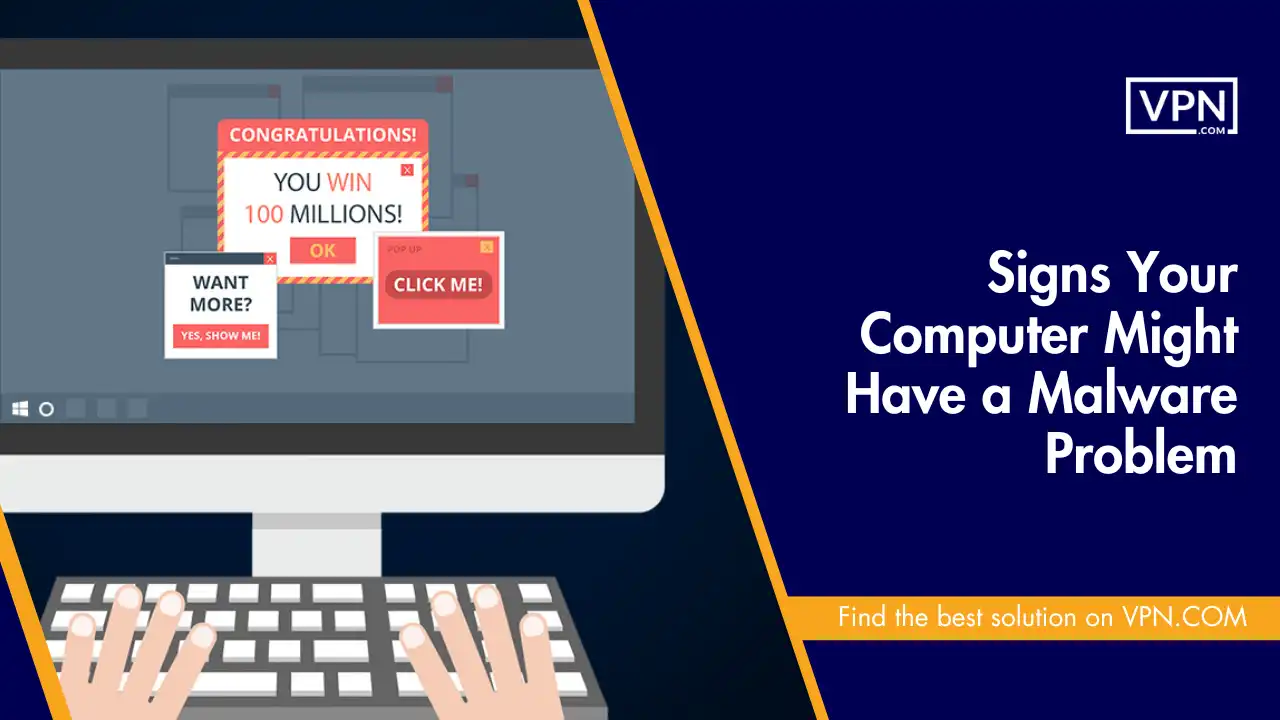
It’s really important to know the signs of a malware infection so you can spot it fast and fix it. Here are some things to look out for:
Your Computer is Slow or Crashes
Malware can make your computer feel slow and flooded. It might freeze a lot or even crash. This could be a sign that malware is messing things up.
Too Many Ads
If you see a bunch of popup ads or your browser keeps taking you to different annoying websites. This could happen even if you’re not using the browser. There is a chance you might have an adware infection. These ads can be so annoying and hard to close. And if you click anywhere on them you might download even more bad stuff.
Strange Things with Your Hard Drive and Internet
If your hard drive light is blinking like crazy when it shouldn’t be, or if there’s a lot of internet activity when you’re not doing anything online, malware might be doing sneaky things in the background.
New Programs You Didn’t Install
Be on the lookout for new programs or browser addons that show up out of nowhere. They might say they’re helpful, but they could be malware pretending.
Your Files are Different or Won’t Open
A big warning sign of ransomware is when your files get infected with malware. They could be locked, and a ransom note would pop up on your screen. However, other malicious software might also change and affect your files in different ways.
Best Ways To Keep Your Computer Safe

Keep Everything Up to Date
One super important thing you should take to protect your device from viruses. You need to make sure your operating system and all your programs are always updated. They should be updated with the latest security fixes.
These updates often solve the minor problems that attackers like to attack through them. You need to turn on automatic updates so you always have the latest updates and protection without any worries.
Use Antimalware Software (But Choose Wisely)
Get yourself some good antimalware software. The antimalware software should be from a well-known security company and keep it up to date. Run regular scans and think about getting real-time protection. These protections can catch threats as soon as they pop up.
Be careful with less-known or “free” security software. These free software can bring the threat of getting malicious malware. Sometimes they have malware hiding inside them!
Back It Up, Back It Up
Make sure to back up your files regularly on your device externally. So your data may stay safe while being saved on an external hard drive or the cloud. That way, if malware or some other dangerous software gets in and affects your computer, you’ve got a second copy to get your hands on.
Think Before You ClickLock It Down
Use strong, unique passwords for all your accounts to stay protected. You also need to turn on multifactor authentication whenever you can. That’s where you need a second option to log in, like a code verification sent to your phone.
If you’re a business, think about increasing your network so malware can’t spread as easily. So you also need to train your employees to spot and avoid threats.

Get Started w/ NordVPN Today
- Top-rated VPN for OS unknown
- Ultra-fast speed in US in 2024
- Save 69% off with VPN.com Discount
- Plans starting at $2.99/month
- Rated 4.5/5 on Google Play with over 825,000 reviews
- Rated 4.7/5 on Apple App Store from 6,600 users
FAQs
Can My Phone Get a Virus?
Yep, phones and tablets can get infected with malicious software easily because of so many reasons. It’s happening more these days. Hackers are targeting our personal devices, computers, laptops, and mobile devices. They know we’re using them for everything nowadays.
How Do Phones Usually Get Virus?
Sketchy apps have viruses in a few common ways: Clicking on bad links in texts or emails and Weaknesses in the phone’s network.
What Are the Warning Signs?
Is your phone acting up? It could be malware. Here are some warning signs to watch out for weird charges on your phone bill: the phone is using tons of data all of a sudden, the battery is draining super fast, and the phone is sluggish or freezing a lot.
Should You Pay Up If Ransomware Hits?
Cybersecurity experts and law enforcement discourage paying ransom. It’s risky because hackers may not unlock your files, demand more ransom, and encourage further attacks. Instead, focus on prevention: maintain backups, update security software, and train employees to recognize threats.
The Bottom Line
In today’s world, we live with updated technologies and cyber threats. Different types of malware affect your devices, so you must keep them safe. These steps are crucial for protecting yourself. Spyware, adware, and ransomware each pose their own unique dangers. These dangers could steal your personal information, bombard you with shady ads, and hold your files hostage for extra money.
These nasty programs can lead to dangerous and malicious threats like drained bank accounts and complete business shutdowns knowing the warning signs for each type is very important, but it’s not enough to keep yourself protected. Hackers are always creating new schemes and tricks. So you need to stay one step ahead by following the Important steps.
These steps include keeping your software updated, using tough security tools, training your team to spot red flags, and having a solid plan ready for when an attack hits. Slacking off on security is a huge mischieve.
Just one successful malware attack can mean massive financial damages, a bad reputation, and furious customers and investors. You need to make protecting your device from malware a top priority. That’s how you can work through even the wiliest cybercriminals. It takes effort and smart spending, but in today’s digital world, strong cybersecurity isn’t optional it’s a must-have for any business that wants to survive and thrive.
Customer Reviews for NordVPN: In-Depth Review, Tests, and Stats

Connection issues with MLB.TV
May, 2 2023

Prompt customer service
May, 6 2023

I would highly recommend
December, 15 2023



